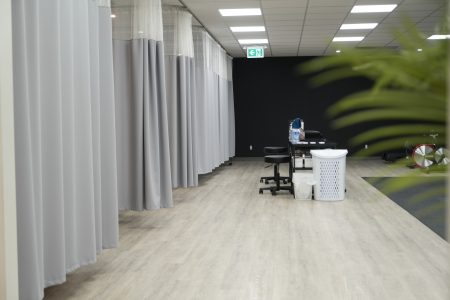Temporomandibular joint (TMJ) / Jaw Initial Assessment
Our comprehensive TMJ and jaw pain assessment helps pinpoint the cause and create a tailored treatment plan for relief.
- Home
- Temporomandibular joint (TMJ) / Jaw Initial Assessment
Temporomandibular Joint (TMJ)
Empower Phsyiotherapy offers a specialized Temporomandibular Joint (TMJ) assessment is tailored to address the unique challenges associated with TMJ-related conditions, providing a pathway to relief and improved function.
What is the TMJ?
The temporomandibular joint, or TMJ, is the joint that connects your jawbone to your skull, facilitating essential movements such as talking, chewing, and yawning. When dysfunction occurs in this joint, it can lead to a range of symptoms collectively known as Temporomandibular Disorders (TMD).
What are common signs and symptoms of TMD?
Common signs and symptoms of TMJ-related conditions include jaw pain, clicking or popping sounds during jaw movement, difficulty or discomfort while chewing, headaches (especially in the temples), tinnitus (ringing in the ears), dizziness, and even neck pain!
What our TMJ assessment entails
Our physiotherapy assessment for TMJ disorders is comprehensive and patient-focused. We conduct a thorough examination, evaluating your jaw function, assessing muscle tenderness, and identifying any contributing factors such as posture, muscle imbalances and your neurological system. We also assess your cervical spine (your neck), as it is often affected with TMD.
Common Conditions related to the TMJ
The most frequently encountered conditions of the TMJ include myofascial pain syndrome, disc displacement, and arthritis. Each condition requires a unique approach to treatment, and our physiotherapists are adept at tailoring interventions to suit individual needs.
What Treatments are their for the TMJ?
Physiotherapy treatments for TMJ disorders may include manual therapy techniques to address muscle tightness and joint mobility, exercises to improve jaw function and stability, and education on posture and relaxation techniques to reduce stress on the TMJ. Additionally, we may incorporate modalities such as dry needling, kinesiology tape and electrical stimulation to alleviate pain and promote healing.
Our goal is to empower you with the knowledge and tools to manage and alleviate TMJ-related issues. Whether you’re experiencing acute discomfort or have been dealing with chronic TMJ symptoms, our dedicated team is here to provide expert care, personalized to your specific needs.
Duration of Assessment
An assessment typically ranges from 60 to 75 minutes. This extended time frame ensures that our team has the opportunity to conduct a thorough evaluation and discuss findings with you in detail.
Advanced Physiotherapy Treatment Options:
Enhance your physiotherapy experience with our exclusive sessions. In addition to the standard treatment offerings, you have the option to add Intermittent Pneumatic Compression Therapy (IPC) and Blood Flow Restriction Training (IPC) at an additional cost of $20 per session.
Common Musculoskeletal Conditions:
Physiotherapists regularly assess and treat a wide range of musculoskeletal conditions. Common issues include
- Muscle Strains and Sprains
- Joint Pain (Arthritis)
- Back and Neck Pain
- Sports Injuries
- Post-Surgical Rehabilitation
- Repetitive Strain Injuries (RSI)
- Tendonitis and Bursitis
- Fractures
- Nerve injuries
Take control of your health
book your physiotherapy session today
Our team is experienced in managing these conditions and more, employing evidence-based techniques to enhance your recovery and overall well-being. Let us empower you on the path to improved functionality and a healthier, more active life.
How it works
Our approach works to give you the personalized care you deserve for lasting results.
Our physiotherapy treatments begin with a thorough understanding of your injury or condition.
Tailored home exercise programs are a fundamental component of our approach.
Sessions of supervised exercises in our clinic are designed to provide hands-on guidance and correction.
Our skilled physiotherapists utilize manual therapy techniques, to enhance joint mobility, and improve overall function.
Dry needling is a therapeutic technique that uses thin needles to release muscle trigger points, reducing pain and improving mobility.

